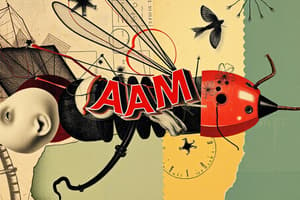Podcast
Questions and Answers
What key concept involves the process by which advantageous traits are passed down to future generations, leading to evolution?
What key concept involves the process by which advantageous traits are passed down to future generations, leading to evolution?
- Natural Selection (correct)
- Genetic Drift
- Speciation
- Hardy-Weinberg Equilibrium
Which principle states that allele frequencies at a single locus remain constant from generation to generation in a large, randomly mating population?
Which principle states that allele frequencies at a single locus remain constant from generation to generation in a large, randomly mating population?
- Natural Selection Principle
- Hardy-Weinberg Principle (correct)
- Genetic Drift Principle
- Speciation Principle
Which factor can lead to the fixation of alleles and loss of genetic variation in a population?
Which factor can lead to the fixation of alleles and loss of genetic variation in a population?
- Speciation
- Genetic Drift (correct)
- Natural Selection
- Hardy-Weinberg Equilibrium
Who are the scientists credited with first proposing the concept of natural selection?
Who are the scientists credited with first proposing the concept of natural selection?
Which fundamental concept emphasizes that certain traits that increase fitness are more likely to be passed down to future generations?
Which fundamental concept emphasizes that certain traits that increase fitness are more likely to be passed down to future generations?
What is the primary mechanism by which advantageous traits are passed down to future generations in natural selection?
What is the primary mechanism by which advantageous traits are passed down to future generations in natural selection?
Which of the following is a key assumption of the Hardy-Weinberg equilibrium model?
Which of the following is a key assumption of the Hardy-Weinberg equilibrium model?
What does genetic drift primarily rely on to cause fluctuations in gene frequencies within a population?
What does genetic drift primarily rely on to cause fluctuations in gene frequencies within a population?
Which evolutionary process can lead to the fixation of alleles and loss of genetic variation in a population?
Which evolutionary process can lead to the fixation of alleles and loss of genetic variation in a population?
In the context of Hardy-Weinberg equilibrium, what does 'no migration' refer to?
In the context of Hardy-Weinberg equilibrium, what does 'no migration' refer to?
What can genetic drift lead to in a population?
What can genetic drift lead to in a population?
How can populations become genetically isolated according to the text?
How can populations become genetically isolated according to the text?
In what context can Hardy-Weinberg equilibrium be applied?
In what context can Hardy-Weinberg equilibrium be applied?
What is a potential consequence of speciation events?
What is a potential consequence of speciation events?
Why is understanding genetic drift important in conservation biology?
Why is understanding genetic drift important in conservation biology?
Flashcards are hidden until you start studying
Study Notes
AP Biology Review: Natural Selection, Hardy-Weinberg, Genetic Drift, and Speciation
AP Biology, a rigorous course, delves into the fundamental concepts and principles of life science. We'll focus on four key areas: Natural Selection, Hardy-Weinberg Equilibrium, Genetic Drift, and Speciation.
Natural Selection
Natural selection is the process by which certain traits that increase an organism's fitness are passed down to future generations, resulting in evolution over time. Organisms with advantageous traits are more likely to survive and reproduce, passing those traits to their offspring. The concept of natural selection was first proposed by Darwin and Wallace and is the foundation of modern evolutionary biology.
Hardy-Weinberg Equilibrium
The Hardy-Weinberg Principle is an important mathematical tool for understanding genetic frequency and inheritance patterns in a population. The principle posits that, in a large, randomly mating population in the absence of other evolutionary factors, the allele frequencies at a single locus remain constant from generation to generation.
Genetic Drift
Genetic drift is a random change in allele frequencies within a population over time. It occurs due to chance events during reproduction, such as the loss of rare alleles or the increase in common alleles. Genetic drift is more significant in small populations and can lead to the fixation of alleles, which can result in the loss of genetic variation.
Speciation
Speciation is the process by which new species arise from existing ones. Speciation can occur through allopatric, sympatric, or parapatric mechanisms, each involving different geographical and ecological factors. These processes lead to the formation of reproductively isolated populations, resulting in the emergence of new species.
AP Biology students must understand these topics and their applications to organisms in various ecosystems. A solid understanding of these concepts will help you to excel in your AP Biology course and future studies in the biological sciences.
Studying That Suits You
Use AI to generate personalized quizzes and flashcards to suit your learning preferences.




